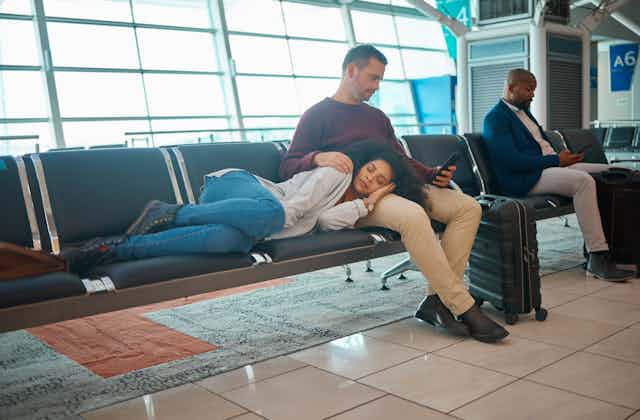The summer of 2023 started well for airlines, after a tumultuous few years following COVID lockdowns in most countries. Passenger numbers were up 30% in the northern hemisphere in June 2023, versus the previous year. But air travel in July and August has been disrupted once again, not only by air traffic control strikes, but also by devastating wildfires in typical tourist hot spots such as Greece, Maui, Tenerife and Canada.
The latest problem – a UK air traffic control fault – has left thousands of passengers stranded after more than one-quarter of UK flights were cancelled on one of the busiest travel days of the year. It will take days to resolve, according to the UK transport secretary, Mark Harper.
Air travellers caught up in these events are legally entitled to care and assistance from airlines under UK law post-Brexit. But our research shows that people are often unsure or completely unaware of their rights when travel is disrupted.
While consumers need more information about their rights in this situation, a group including consumer affairs organisation Which? and online travel agents have also called on the UK prime minister to give the airline regulator, the Civil Aviation Authority, more power to punish airlines that don’t help consumers affected by disruption.
At present the regulator is unable to directly and independently fine an airline, it must bring a court action. The CAA also has weak enforcement powers compared with airline regulators in other countries. Which? wants the CAA to be able to directly fine airlines for failing to either provide clear and timely information about passenger rights and what to do when air travel is disrupted, or assistance with rerouting if a flight is cancelled, or a prompt refund.
Uncertainty about legal rights of air passengers
Compliance by airlines with consumer protection laws has been problematic for some time. But the mass cancellation of flights during the COVID pandemic and the failure of many airlines to refund some passengers really brought the problem to the wider public’s attention.
We have researched passenger experiences of flight cancellations during the pandemic, as well as the level of awareness among air passengers of both their legal rights and routes to redress. Media coverage by the likes of ITV’s personal finance expert Martin Lewis and online information from consumer bodies such as Which? certainly boosted awareness during COVID.
But our research suggests that many travellers are still not sure what action to take if their rights are not respected by an airline. People are also unaware of all the options open to them when seeking redress.
These problems are even more acute for passengers who have booked through an online travel agent rather than directly with the airline. Several of the participants we spoke to during focus groups said they trusted the airlines to look after them or relied on travel insurance. But travel insurance does not always cover the specific situation faced and some airlines have failed to live up to the trust consumers place in them.
How to get redress for travel disruption
If your flight has been cancelled by an airline or you need to seek redress for other reasons, you should contact your airline directly in the first instance. If you don’t get a response, or are unsatisfied with the response, there are other options.
For example, “alternative dispute resolution” bodies can help mediate with airlines, but our study showed passengers were unaware of the two ADR bodies in the UK, the Centre for Effective Dispute Resolution (CEDR) and AviationADR.
Further, not all airlines are members of the schemes and ADR decisions are not binding. And while the CEDR has reports high levels of demand on its homepage, Which? has called for a mandatory aviation ombudsman to be established to help mend “the broken complaints system”.
Alternatively, you could bring a court action against an airline, although this can be tricky if the airline is based abroad. Our study also showed passengers are often short of time and do not always have the confidence to pursue an action before the small claims court.

Cost can be another determining factor for action. Passengers are more likely to make a claim where the cost of a family holiday runs into thousands of pounds, according to our research. In the past decade, specialist claims firms have started to offer to make claims on behalf of passengers. These firms often have useful websites that can instantly assess whether a claim is worth pursuing. Of course, there will also be a cost to use these firms.
Although court action can be seen as a last resort, in March this year Which? found £4.5 million is owed to passengers from outstanding County Court Judgments (CCJs) and attempts by passengers to obtain money owed by airlines using bailiffs.
However, our study showed that one of the most successful ways to secure a refund was under Section 75 of the Consumer Credit Act. This allows you to make a claim to the bank or provider of the credit card you used to pay for your flights.
What about the airline regulator?
The routes available for consumers to seek redress for travel disruption will continue to be ineffective if they rely on resolving disputes with the airlines on an individual level. This pits the weaker consumer against the powerful interests and deeper pockets of the airlines.
This is why enhanced powers for the UK’s CAA are vital. The Department for Transport proposed reforms in January 2022, but the UK government has yet to act.
After a summer of travel disruption that has caused delays and cancellations for thousands of people, a regulator with more teeth will help air passengers caught up in such crises.

